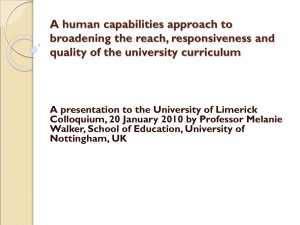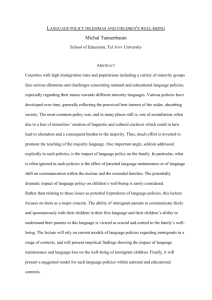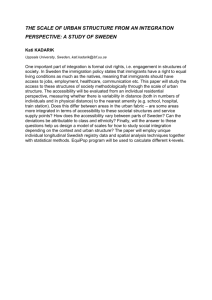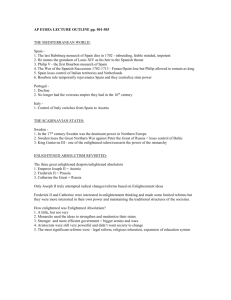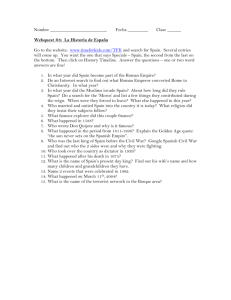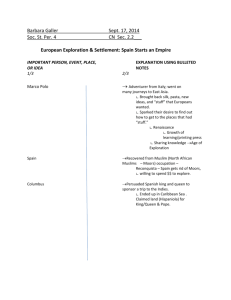Child well-being in the UK, Spain and Sweden
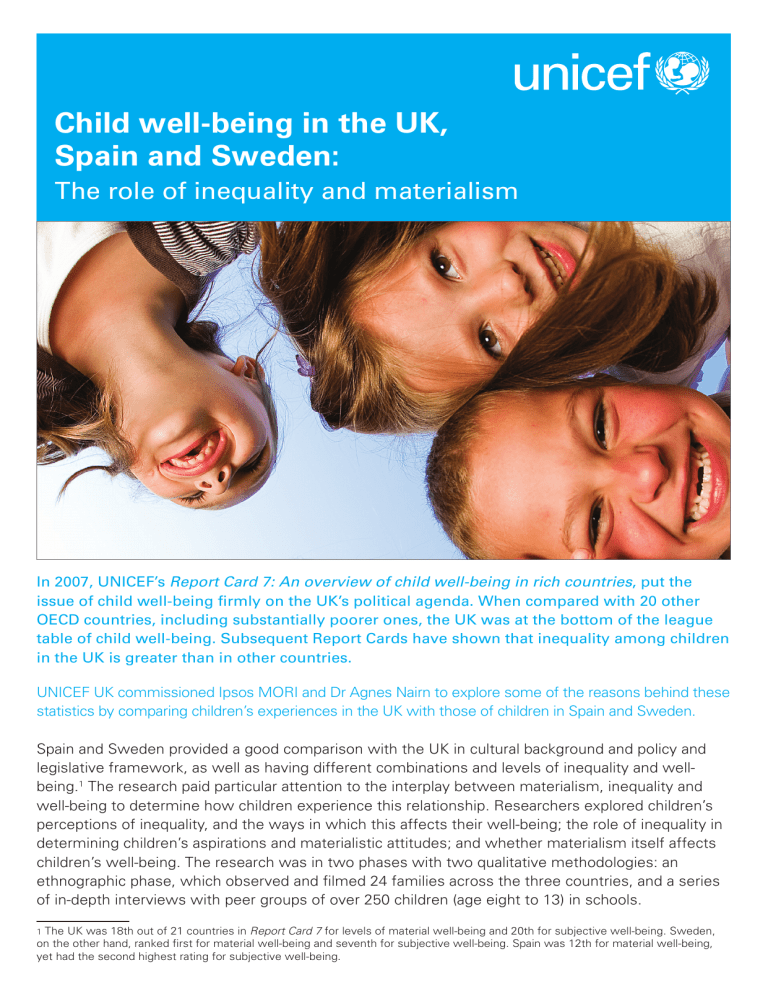
Child well-being in the UK,
Spain and Sweden:
The role of inequality and materialism
In 2007, UNICEF’s Report Card 7: An overview of child well-being in rich countries, put the issue of child well-being firmly on the UK’s political agenda. When compared with 20 other
OECD countries, including substantially poorer ones, the UK was at the bottom of the league table of child well-being. Subsequent Report Cards have shown that inequality among children in the UK is greater than in other countries.
UNICEF UK commissioned Ipsos MORI and Dr Agnes Nairn to explore some of the reasons behind these statistics by comparing children’s experiences in the UK with those of children in Spain and Sweden.
Spain and Sweden provided a good comparison with the UK in cultural background and policy and legislative framework, as well as having different combinations and levels of inequality and wellbeing.
1
The research paid particular attention to the interplay between materialism, inequality and well-being to determine how children experience this relationship. Researchers explored children’s perceptions of inequality, and the ways in which this affects their well-being; the role of inequality in determining children’s aspirations and materialistic attitudes; and whether materialism itself affects children’s well-being. The research was in two phases with two qualitative methodologies: an ethnographic phase, which observed and filmed 24 families across the three countries, and a series of in-depth interviews with peer groups of over 250 children (age eight to 13) in schools.
1
The UK was 18th out of 21 countries in Report Card 7 for levels of material well-being and 20th for subjective well-being. Sweden, on the other hand, ranked first for material well-being and seventh for subjective well-being. Spain was 12th for material well-being, yet had the second highest rating for subjective well-being.
The findings
This research reveals how children and families in different societies tackle complicated issues in their everyday lives in very different ways. It clearly exposes some of the specific pressures faced by children and families in the UK, uncovering new dimensions to family life, and sheds new light on the motivations and responses of children and families when dealing with inequality and materialism.
all of these dynamics in Spain and Sweden, the pressure to consume appeared much weaker and the resilience of children and parents much greater than in the UK. Families in the UK appear to face greater pressures on their time and money, and react to this in ways they feel are counter productive to children’s well-being. Parents found it very hard to challenge the commercial pressures around them and their children.
Our findings paint a complex picture of the relationship between well-being, materialism and inequality across Spain, Sweden and the UK. Time with family and friends and activities outside the home emerge as central to children’s subjective well-being, and material goods appear to be used by children often as social enablers rather than as direct contributors to their own happiness.
Children in all three countries told us they wanted time with their parents and families, good relationships with their friends, and lots of stimulating things to do. In the UK, we found parents struggling to find time to be with their children, or to help them participate in sporting and creative activities. It was also clear that parents in the UK found it more difficult than parents in Spain and Sweden to set clear boundaries for their children.
The research reveals that consumer goods play a multi-faceted role in children’s lives – sometimes positive and sometimes negative – and there is no doubt that status technology and clothing brands play their part in creating or reinforcing social divisions between the more and less affluent. While we saw
Well-being
The message from all the children who participated in the research was simple, clear and unanimous: their well-being centres on time with a happy family whose interactions are consistent and secure; having good friends; and having plenty of things to do, especially outdoors.
”It was a great day on Sunday because … I spent time with my family, we had a day out … everyone was there”, age 12, UK
”I’d like to see my family more, not just my parents but my aunts and uncles too” , age 10, Spain
”If it is going to be a good day, I need to spend time with my best friends” , age 9, Sweden
Yet despite this commonality, the ethnographies demonstrated that family life in the three countries was strikingly different. In UK homes, parents were obviously struggling to give children the time they so clearly wanted; in Spain and Sweden, family time seemed to be part of the fabric of everyday life. We also noticed that the family roles played by
mothers, fathers and children, and the boundaries and expectations that governed family life, were more clearly defined in Spain and Sweden than in the
UK. Moreover, by the time many children in the UK reached secondary school, their participation in active and creative pursuits – activities that children said made them happy – had reduced, something that occurred less in other countries. It also became clear that children from lower-income families in the UK had less access to stimulating outdoor activities.
While the more functional aspects of consumer goods – such as sports equipment to play in a local team, or a laptop to stay in contact with family far away – were largely benign, the symbolic use of brands to either confer superior status or avoid bullying was much more problematic.
“I’ve got an iPod nano, but I just kinda want something better, with cool apps and stuff” age 13, UK
,
In comparing life in Spain, Sweden and the UK, we found UK parents struggling and pushed to find the time their children need. Uncertainty about the rules and roles operating within the family further exacerbated the sense of struggle. We found less participation in outdoor, sporting and creative activities among older children and children from lower-income families.
Materialism
The evidence from the children and families participating in this research demonstrated a more complex picture of materialism than is often assumed. Most notably, in the UK it appeared that materialism raised as many issues for adults as for children.
”I usually get new things for my birthday so when I want something that’s when I ask for it” constantly” , mother, UK ethnography
, age 9, UK
”I’m not really spoilt because I don’t really get everything every day” , age 9, UK
”They have so much, I’m constantly getting rid of stuff because they’re being given stuff because things are so cheap, they’re just given stuff
The role of consumer goods in the lives of children proved to be multi-faceted and not easily reduced to a single notion of acquisitiveness. Most children in all three countries agreed that it was not desirable to get everything they wanted – “spoiled” children were universally derided. Notions of waiting, saving up for and earning material rewards were highly regarded by the vast majority of children. While children actively coveted certain technology and clothing brands, most did not regard new toys, fashion items and gadgets as central to their well-being. Rather than wanting to acquire things for their own sake, children seemed to use material objects and consumer goods to fulfil a range of purposes in their lives: utilitarian, symbolic and social.
Most children agreed that family time was more important to them than consumer goods, yet we observed within UK homes a compulsion on the part of some parents to continually buy new things for their children and for themselves. Boxes of toys, broken presents and unused electronics in the home were witness to this drive to acquire new possessions. Most parents realised that what they were doing was often “pointless”, but seemed somehow pressurised and compelled to continue.
Parents from the UK often bought their children status brands, believing that they were protecting them from the kind of bullying they had experienced in their own childhoods. This compulsive acquisition and protective, symbolic brand purchase was largely absent in Spain and Sweden, where parents were clearly under much less pressure to consume and displayed far greater resilience.
”Like the Wii … all their wee pals had it and so I bought it and then they don’t look at it. It sits there.
It’s like an ornament. It’s all they need it, they need it, they need it. It’s like a novelty for a wee while and then they’re not interested” , mother,
UK ethnography
In comparing life in Spain, Sweden and the UK, we found that many children in the UK did not refer to material goods when asked what made them happy and also understood the principles of moderation in consumption. Yet parents seemed to feel compelled to purchase things for their children, often against their better judgment.
Inequality
There are well-documented links between unequal societies and low levels of well-being. Our research showed clearly that awareness of inequality or social and cultural difference became more prominent for older children in secondary school. At this stage of child development, material goods and brands began to play an important part in how children identified with their peers, and how they began categorising their peers into social groups. In the UK and to a
lesser extent in Sweden, high status brands tended to be more important to children from less affluent backgrounds, perhaps as a means of masking financial and social insecurities and bolstering selfesteem. Inevitably, expensive brands symbolised wealth, with the rich and the poor marked out clearly by their possessions.
”No matter how much money they have, people still manage to put up a front of like they have money – the way to prove it is like, say they have an iPod, even if they save their money for years [to buy it], and then instantly, they’ll be accepted into whatever social circle there is … You could live in a dustbin, and as long as you have an iPod, a Blackberry, then you’re accepted. Ok, it’s a bit of an exaggeration but you know what I mean” age 14, UK
,
While the link between brands and inequality created some tension and anxiety for children in all three countries, parents in the UK were the only parents to share these feelings. Swedish and Spanish parents seemed not to belong to a “consumer generation” in the same way as UK parents. In the UK, the research also highlighted inequality in children’s access to outdoor, sporting and creative activities.
Children from low-income families generally spend more time in front of screens, while the more affluent had access to a wider range of sports and other pursuits. It was also noticeable that the most important feature of these activities for many affluent children was demonstrating superiority over others by “coming first”. The impetus to succeed in Spain was motivated more by pleasing parents and doing well personally (rather than doing better than others); in Sweden, outdoor, sporting and creative activities were rarely associated with social comparison.
Although children articulately shared their views that fashionable brands did not bring lasting happiness, and were quick to deride ”posh people” who could afford the latest technology and designer labels, it was clear that they also desired some aspects of that lifestyle and used brands symbolically themselves.
Children in Spain and the UK – both countries with high levels of inequality – had very definite characterisations of poorer children – a “chav” in the
UK; an “ embustero ” (liar) or “ malote ” (bad guy) in
Spain – which came with certain negative personality traits or behaviours. They also had corresponding characterisation for rich children – “posh” in the UK or “ pijo ” in Spain – that had similarly negative (albeit different) connotations.
In comparing life in Spain, Sweden and the UK, we found a growing awareness of inequality among children as they got older. Children had an ambivalent attitude to those who appear to be able to afford all the latest status goods. While many British parents purchased status goods to hide social insecurities, this behaviour was almost totally absent in Spain and Sweden. Inequality also had its part to play in restricting access to outdoor, sporting and creative activities in the UK.
Recommendations
because of low wages, requiring parents to hold several jobs or work long hours to make ends meet.
In considering the relationship between materialism, inequality and well-being in the UK, Spain and
Sweden, we found significant differences in how these concepts played out in each country. The research was wide-ranging in terms of the issues that arose and were explored by the children and families taking part, with different drivers and reactions uncovered from a child’s – as opposed to an adult’s – perspective. However, at the very heart of the matter, a consensus emerged from children in all three countries about what was important to their well-being: time and good relationships with their family and friends, a range of activities to engage in and exciting things to do outside the home. At the same time, children had an ambivalent and rather less certain approach to the role of materialism in their lives. It is on these themes that UNICEF UK is focusing in order to look at the steps that the
UK Government and others should take to support society to limit the negative impact that materialism and inequality can have on children’s well-being.
1. Time
Children highly value time with their parents, but parents in the UK are struggling to give them the quality time they want and need. In Spain and
Sweden, there seemed to be a strong and shared social expectation that family took priority over work and other commitments.
In the UK, parental leave and flexible working policies have gone some way towards helping some parents to juggle family and work commitments, and form a good foundation for supporting family life. However, we still see a significant ‘time squeeze’ in the UK that is simply not present to the same degree in Spain and
Sweden. Families in Spain function as an extended unit much more than in the UK. In Sweden, social policy allows family time within a culture that solidly reinforces its importance.
UNICEF’s Report Card 9 showed that, among developed countries, the UK has one of the widest gaps in material well-being between the poorest children and the rest 2 , making it essential that the
UK Government, in its drive to build a family-friendly culture, recognises and tackles the negative impact of high levels of income inequality on children’s well-being. In our research, we observed families finding it difficult to spend time with their children for many different reasons – some due to long hours demanded by their particular jobs, but many others
2
Innocenti Research Centre (2010), Report Card 9: The children left behind. UNICEF .
UNICEF UK encourages the UK Government to focus more strongly on how its policies affect family life, with particular consideration of their impact on the time that parents and children are able to spend together. Our research shows that low-income families find this particularly difficult, and receiving at least a Living Wage would enable these parents to work fewer and more reasonable hours and have more time to spend with their children – essential from birth throughout the teenage years to young adulthood.
The UK Government can take the lead in this by ensuring that all its employees and subcontractors receive at least a Living Wage. It should also work with businesses through organisations such as the CBI (Confederation of
British Industry) and the Confederation of Small
Businesses to encourage them to adopt the
Living Wage.
This would help to create a strong, fairly paid and motivated workforce that enables parents to give their children the time and attention they have both said they need. Adopting the Living Wage would also enable the UK Government to drive forward its commitment to eradicating child poverty in the UK and fulfil its obligations under Article 27 of the UN
Convention on the Rights of the Child to support parents to provide an adequate standard of living
(which includes time) for their children.
2. Activities
All of the children participating in the research told us they enjoyed taking part in activities outside their home and school, with outdoor activities given particular importance. They liked to do these activities with other children, with parents, and with extended family members. They especially favoured activities that enabled them to forge new friendships. While children from all socio-economic backgrounds took part in such activities in Spain and Sweden, in the
UK it was noticeable that children and teenagers from lower-income families did not have the same opportunities to take part in structured activities as other children. This may be for a variety of reasons: lack of available activities in their communities, insufficient money to support children’s participation in activities, travel difficulties, and parents not having the time to support their children to take part. The inability of lower-income parents to ‘purchase’ activities for their children to compensate for the
‘time squeeze’ they faced magnified this inequality.
This research took place in late 2010 and early
2011, before many of the cuts to UK public services had begun to take effect. Since then, many local authorities have reduced levels of funding – and consequently, levels of provision – for play and youth services, a development exacerbated by the decision of the UK Government not to ringfence money for these activities. With some youth services and centres now closed entirely, others merged or significantly reduced, and funding for local playgrounds under threat (with one council deciding to charge for access), there is a very real risk of limiting children’s access to play and leisure activities, a right protected under Article 31 of the UN Convention on the Rights of the Child. This is a particular concern for children and teenagers from lower-income families, who are disproportionately more likely to suffer from a reduction in publicly funded activities, negatively affecting their current well-being as well as their goals and aspirations for the future.
We also encourage local authorities across the UK to prioritise the needs of children and young people in this regard.
3. Dealing with a materialistic culture
In the comparison of children’s and families’ experiences in the UK, Spain and Sweden, we found that a materialistic and commercial culture is embedded in the UK and in concepts of good parenting in a way that is not seen in Spain and
Sweden. It was clear that as children moved to secondary school, clothing, footwear and technology brands became increasingly important in both creating identity and signalling membership of particular social groups in all countries. However, lower-income children in the UK particularly desired such brands.
It was clear that, in addition to its role in children’s relationships with their peers, materialism has become enmeshed in children’s relationships with family and friends. Families in the UK, more so than families in Spain and Sweden, use material goods and new technology to compensate for social insecurities and the lack of time they have to be with their children.
The UK Government has emphasised its commitment to improving national well-being, in part through the development of national well-being indicators through the Office of National Statistics. In order to support this commitment, the UK Government must ensure that children (and particularly those from low-income families) do not lose out in the difficult decisions being made in public service provision.
UNICEF UK calls on the UK Government to require local authorities to assess the impact of public spending decisions on children to ensure local budgets allow investment in play facilities and free leisure activities for both children and families.
Regulations are already in place that attempt to minimise the negative social impact of brands on children. Section 5.2.1 of the Code of the Committee of Advertising Practice states that “children must not be made to feel inferior or unpopular for not buying the advertised product”, while Section 5.6 of the
Code of the Broadcast Committee of Advertising
Practice requires that “advertisements must not imply that children are likely to be ridiculed, inferior to others, less popular, disloyal or have let someone down if they or their family do not use a product
or service”. Yet the research shows that these are exactly the things that children do feel and experience in relation to popular brands and new technology.
Letting Children Be Children , an independent review of the commercialisation and sexualisation of children led by Reg Bailey and commissioned by the UK Government, took as one of its themes children as consumers. In his final report, Bailey calls for regulations protecting children from excessive commercial pressures to be “comprehensive and effective across all media” and to reflect more closely the views of parents and children, as well as for self-regulatory advertising codes to prohibit the employment of children (under-16s) as brand ambassadors and in peer-to-peer marketing. UNICEF
UK supports these calls. However, our research additionally showed that although many UK children and parents have a sophisticated understanding of the pressures of materialism, the views and behaviours they demonstrate make it clear that many of them are still at a loss when trying to combat these pressures in their daily lives.
Find out more unicef.org.uk/childwellbeing
8
parliamentaryteam@unicef.org.uk
Acknowledgments and thanks
In 1991, Sweden banned television advertising aimed at children under the age of 12. Considering taking a similar step in the UK would go some way towards lifting some of the commercial pressures on children and families. It would also serve to respond to the Prime Minister’s call to “put the brakes on an unthinking drift towards ever greater commercialisation and sexualisation of children” 3 in a context where it is clear that materialism and inequality impact negatively on the well-being of many children in the UK.
Thank you also to the project’s lead academic Dr
Agnes Nairn, Professor of Marketing at EM-Lyon
Business School, Ipsos MORI and the researchers in the UK, Spain and Sweden for undertaking this project in partnership with UNICEF UK, with particular recognition to Oliver Sweet who led the ethnographic video case studies.
Finally, thanks also go to the expert advisory group that supported us to develop and carry out the research:
The Swedish legislation prevents advertising from aiming to capture the attention of children under 12; it also prevents adverts being shown before, during or after a programme aimed primarily at under-12s.
The ban does not affect other information provided to children through public service announcements, safeguarding children’s rights under Articles 13 and
17 of the UN Convention on the Rights of the Child to access information.
The Government must now show strong leadership in order to support families to fight back against the ways in which the UK’s materialistic culture embeds inequality in our society, affects family time and relationships, and has a negative impact on children’s well-being.
3
Letter from Prime Minister David Cameron to Reg Bailey on his review of the commercialisation and sexualisation of childhood,
Letting Children be Children , 6 June 2011: www.number10.gov.
uk/news/letter-to-reg-bailey-following-his-review-of-the-commercialisation-and-sexualisation-of-childhood
UNICEF UK would like to thank the 24 families in the UK, Spain and Sweden that took part in the ethnographies and allowed us into their lives. We would also like to thank the 250 children and young people that participated in the research for sharing their views and experiences, and the three national steering groups of 14 year-olds in all three countries for their insights.
Barbara Maughan, Professor of Developmental
Epidemiology, Kings College London,
Institute of Psychiatry
Ed Mayo, Secretary General, Co-operatives UK
Gerison Lansdown, international children’s rights consultant
Helene Brembeck, Professor of Ethnology and Deputy
Director, Centre for Consumer Science,
Gothenburg University
Jonathan Bradshaw, Professor of Social Policy,
University of York
Julia Wilcox, Economist, Department for Education
Kate Pickett, Professor of Epidemiology, University of York
Maria von Bredow, UNICEF Spain
Richard Bartholomew, Chief Research Officer, Department
for Education and Joint Head of Government Social
Research Service
Sean O’Halloran, Chair, Waltham Forest Young Advisors
Tim Kasser, Professor and Chair of Psychology,
Knox College, USA
Victoria Tur Vines, Head of Children and Communications
Research Centre, Alicante University
The independent research was funded by the
Department for Children, Schools and Families.
